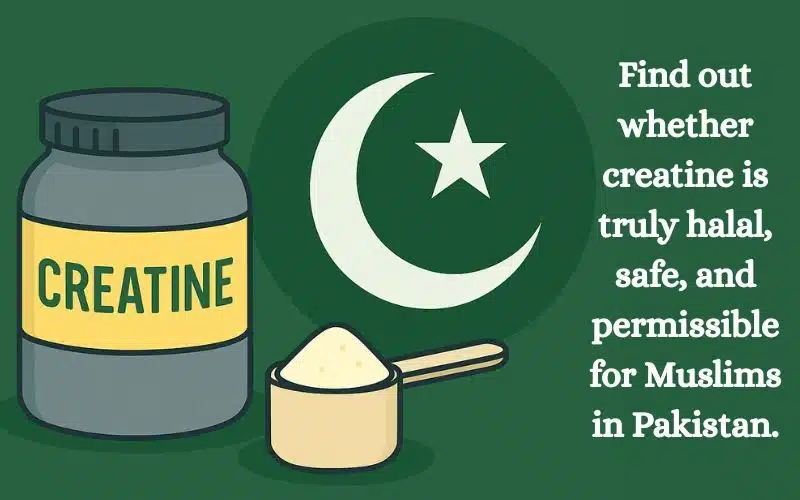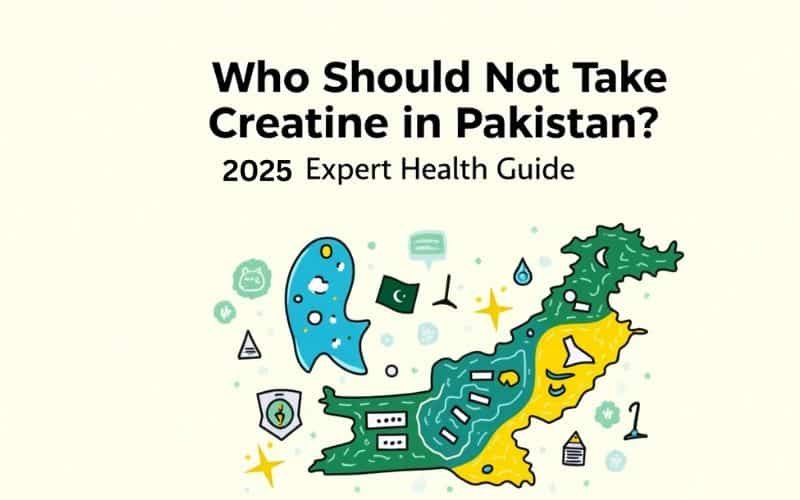No products in the cart.
Return To ShopWho Should Not Take Creatine in Pakistan? (2025 Expert Health Guide)
As the fitness culture continues to grow in Pakistan especially among young adults in cities like Lahore, Karachi, and Islamabad creatine has become one of the most widely used supplements in gyms across the country. While creatine is often praised for its proven benefits in increasing strength, enhancing muscle mass, and boosting athletic performance, it’s not suitable for everyone.
This guide provides medically accurate, research-backed insights on who should not take creatine in Pakistan, helping Pakistani consumers make safe, informed decisions about their health and fitness journey.

What Creatine Does in the Body
Creatine is a naturally occurring compound found in muscles and produced in small amounts by the liver, kidneys, and pancreas. It plays a critical role in regenerating ATP (adenosine triphosphate) your body’s primary energy currency during high-intensity activities.
Proven Benefits of Creatine:
- Improves muscle strength and power output
- Supports faster recovery between workouts
- Enhances lean body mass over time
However, creatine is not universally suitable. For certain individuals, the risks may outweigh the benefits especially in the context of Pakistan’s hot climate, limited access to professional nutritional guidance, and underdiagnosed health conditions.
Who Should NOT Take Creatine in Pakistan
Find out if creatine is unsafe for you and who should completely avoid it in Pakistan.
People with Pre-Existing Kidney Conditions
Creatine is metabolized into creatinine, a compound excreted by the kidneys. Individuals with chronic kidney disease (CKD) or reduced kidney function may be at risk when supplementing with creatine. According to a 2023 clinical review published in the Journal of Renal Nutrition, creatine may increase the kidney’s filtration load, which is especially concerning for those with undiagnosed or early-stage renal impairment.
Recommendation: If you have a history of kidney stones, diabetes, or hypertension (all of which are increasingly common in Pakistan), consult a nephrologist before starting creatine.
Those with Liver Disorders
Although creatine is primarily metabolized in muscle and excreted by the kidneys, liver enzymes are involved in its synthesis. People with hepatitis, fatty liver disease, or other hepatic conditions may experience unpredictable responses to creatine supplementation.
Note: Liver disorders are common in rural and urban Pakistan due to high hepatitis C prevalence. Medical advice is essential.
Teenagers Under 16 Without Medical Advice
A common question is: “Is creatine safe for teenagers in Pakistan? While some studies show no adverse effects in healthy adolescents, the lack of clinical data for growing teens makes unsupervised use risky. Moreover, teenagers often fail to meet hydration or dietary requirements, increasing the chance of creatine-related side effects.
Guidance: Creatine should only be used by minors under strict guidance from a certified pediatrician or sports physician.
People with High Blood Pressure or Heart Conditions
Creatine may cause water retention, potentially increasing blood pressure in sensitive individuals. Those with existing hypertension, arrhythmia, or heart disease should avoid creatine unless cleared by a cardiologist.
In Pakistan, where heart disease is the leading cause of death, this warning carries extra weight.
Women Who Are Pregnant or Breastfeeding
There is no conclusive evidence supporting the safety of creatine during pregnancy or lactation. Any supplement that alters metabolic pathways should be avoided during these stages unless prescribed by a physician.
People Taking Interacting Medications
Creatine may interact negatively with:
- Diuretics (used for blood pressure)
- NSAIDs (common painkillers like ibuprofen)
- Nephrotoxic medications (e.g., certain antibiotics)
Combining these with creatine may increase creatine and kidney health risks, especially in regions with limited medical follow-up care.
Individuals in Pakistan’s Extremely Hot Climate Not Staying Hydrated
Creatine pulls water into muscle cells, increasing the risk of dehydration in hot, humid environments—especially when fluid intake is insufficient. In Pakistan’s summers, this could lead to heat exhaustion, cramps, or dizziness.
Hydration is critical. If you cannot consistently drink 2.5–3 liters of water daily, avoid creatine during summer months.
Creatine Side Effects in Pakistan’s Climate
Pakistani gym-goers, especially in cities like Multan, Faisalabad, and Hyderabad, often train in non-air-conditioned gyms with limited ventilation. This can compound creatine’s water retention effects.
Common side effects include:
- Dehydration
- Stomach cramps or bloating
- Nausea or diarrhea
- Muscle cramps in hot conditions
These effects are preventable but more pronounced in climates with extreme heat and poor hydration habits.
Is Creatine Halal and Safe for Muslims in Pakistan?

Creatine is typically synthesized in labs from non-animal sources, making most commercially available creatine halal. However, due to the lack of labeling regulations in Pakistan, it’s important to check for:
- Halal certification from recognized bodies
- Ingredient transparency
Most reputable creatine brands sold through verified platforms are safe, but Muslim consumers should remain vigilant about certification if religious compliance is essential.
How to Make an Informed Decision
Talk to a Healthcare Provider
Before taking creatine, discuss:
- Your medical history
- Any medications you’re using
- Your hydration levels and diet
Read the Label Carefully
- Avoid proprietary blends or creatine mixes with caffeine
- Look for 100% creatine monohydrate, preferably micronized
Stay Hydrated
- Drink plenty of water before, during, and after workouts especially during hot months
Frequently Asked Questions (FAQ)
Can creatine damage kidneys long-term?
In healthy individuals with no underlying kidney disease, creatine is generally safe. However, in people with pre-existing conditions or dehydration risks, it can exacerbate renal stress.
Is creatine safe for gym beginners?
Yes, but only if you’re:
- Over 18
- Not on any medications
- Hydrating well
- Cleared by a doctor if you have medical concerns
Can I take creatine during Ramadan or fasting?
Creatine can be taken after Iftar, but it’s essential to:
- Avoid caffeine
- Drink extra fluids
- Skip loading phases during fasting periods
Conclusion: Who Should Not Take Creatine in Pakistan?
While creatine is one of the most effective and well-researched supplements, it’s not suitable for everyone. If you’re in any of the following groups:
- Have kidney or liver problems
- Are under 16
- Pregnant or nursing
- Take interacting medications
- Struggle with hydration in Pakistan’s heat
then you should avoid creatine or only use it under medical supervision.In a market flooded with supplements and misinformation, it’s essential to stay informed. Your health and safety come first consult your doctor, do your research, and make decisions backed by science.









Add comment